Solarbotics will be at the Calgary City Teachers' Convention Thursday & Friday, February 16 and 17, 2017. We will demo a variety of educational kits for teachers to use in classrooms, including introductory kits to develop skills in programming, mechanical construction, and soldering. Come put a face to the name at booth 727 at Calgary […]
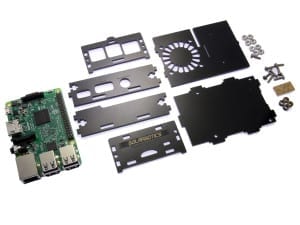
Solarbotics Raspberry Pi 3 SAFE Assembly...
The instructions for assembling the Pi v3 and the previous acrylic Pi SAFE are quite similar. The only difference between the models is the location of the LED light pipes, so these Pi3 instructions apply generally to all Pi SAFE versions.
1. Your Parts!

- 8 x 4-40 nuts
- 8 x 4-40 x 3/8" bolts
- 2 x Clear acrylic light-pipes
- 4 x Black acrylic spacers
- 6 x Black acrylic SAFE sides (shown here with brown protective paper already removed)
- 0 x Raspberry Pi (sorry - not included in the kit!)
2. The Baseplate
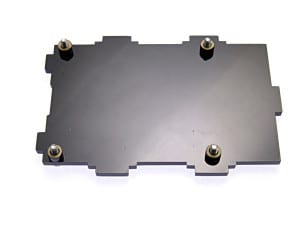
Find 4 of the 4-40 x 3/8" bolts, and put them through the baseplate, and press the spacers on from the other side. Thee bolts will sort of stay put until you can get the Raspberry Pi on the baseplate. (If adding to a VESA mount, do only 2 diagonal screws)
3. Adding the Raspberry Pi
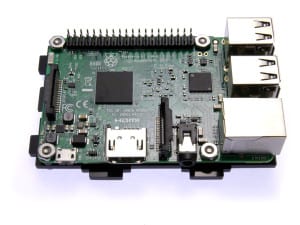
Slide the Raspberry Pi onto the bolts. The Pi is designed for metric M3 hardware, but we're still using imperial #4 hardware, which is a smidge bigger. The bolts may need to be screwed through the holes in the Pi.
Add the #4 nuts, and tighten them down.
4. Adding 3 of the 4 Sides
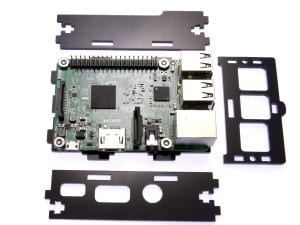
Arrange the sides as shows. The sideplate on the top in this image has the long cutout to accommodate a ribbon cable from the 40-pin expansion port. The front faceplate on the right (with the label engravings face-down) is for the communications side. The sideplate on the bottom has the ports for the power, video, and audio I/O.
Align them all up on the baseplate, and use a pair of 4-40 nuts and bolts to lock them in place.
5. Adding the SD-Card / LightPipe Faceplate
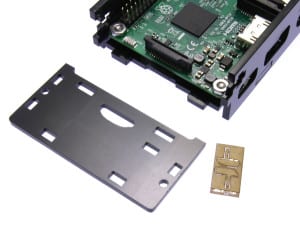
Lay the final side faceplate face-down beside the assembly, and pop the clear lightpipe parts out of their holder. It is not necessary to strip the paper off this part.
Sandwich the two lightpipes together, and push them into the lightpipe indicator hole. They will sit a bit loose until the faceplate is attached to the baseplate.
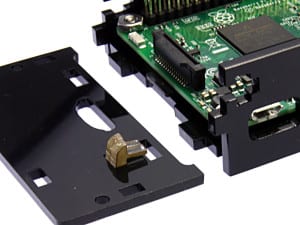
Carefully assemble this assembly to the baseplate, and finish attaching it with the remaining 4-40 nuts and bolts.
Step 6: Top Plate mounting
Notch the top plate into the slots in the rear faceplate, and gently flex the frontplate out to let the tab snap into place. You're ready to power up, with full access to the indication LEDs on the Pi mainboard via the lightpipes!
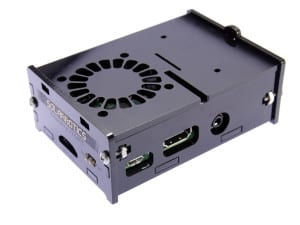
.
MORE POSTS
Brought to you from every corner of the great internets. Laser Cut Junk Food.. by I'm Your Present (Via TLC) Leatherman Tread ..and the unboxing of it. Wonder how it will behave at airport security..(Via Notcot) Blue Whale Experience This is what it looks like being a blue whale and feeding on krill, by the Goldbogen […]
Jerome, our squiggly-bearded intern from many moons ago that created the BeetleBot, just pointed us towards this totally pimpin' pinewood derby car. The author from sliptonic.com shows how he made his sweet lowrider with hydaulic(esque) action by using a small micro-servo for each wheel, an Ardweeny for brains, and a 9V battery for power. The […]
As great Creality Printers generally are, it's still a hassle to get parts and pieces to fix or enhance your printer. This explains why we were quite thrilled to see some BIG boxes come in from Creality the other day, containing: Replacement Ender-3 24V Hot Ends CR Series Inductive Leveling Kits BL-Touch Kits Ender-3 1.1.5 […]
Solarbotics, Ltd. is not responsible for misprints or errors on product prices or information. For more information, please see our Terms and Conditions.
Warning: This product contains chemicals known to the State of California to cause cancer and birth defects or other reproductive harm.
Please visit www.P65Warnings.ca.gov for more information. This item was manufactured prior to August 31, 2018.

